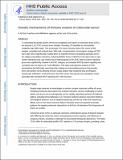Genetic Mechanisms of Immune Evasion in Colorectal Cancer
Author(s)
Grasso, Catherine S.; Giannakis, Marios; Wells, Daniel K.; Hamada, Tsuyoshi; Mu, Xinmeng Jasmine; Quist, Michael; Nowak, Jonathan A.; Nishihara, Reiko; Qian, Zhi Rong; Inamura, Kentaro; Morikawa, Teppei; Nosho, Katsuhiko; Abril-Rodriguez, Gabriel; Connolly, Charles; Escuin-Ordinas, Helena; Geybels, Milan S.; Grady, William M.; Hsu, Li; Hu-Lieskovan, Siwen; Huyghe, Jeroen R.; Kim, Yeon Joo; Krystofinski, Paige; Leiserson, Mark D.M.; Montoya, Dennis J.; Nadel, Brian B.; Pellegrini, Matteo; Pritchard, Colin C.; Puig-Saus, Cristina; Quist, Elleanor H.; Raphael, Ben J.; Salipante, Stephen J.; Shin, Daniel Sanghoon; Shinbrot, Eve; Shirts, Brian; Shukla, Sachet; Stanford, Janet L.; Sun, Wei; Tsoi, Jennifer; Upfill-Brown, Alexander; Wheeler, David A.; Wu, Catherine J.; Yu, Ming; Zaidi, Syed H.; Zaretsky, Jesse M.; Gabriel, Stacey; Lander, Eric Steven; Garraway, Levi A.; Hudson, Thomas J.; Fuchs, Charles S.; Ribas, Antoni; Ogino, Shuji; Peters, Ulrike; ... Show more Show less
DownloadAccepted version (1.224Mb)
Terms of use
Metadata
Show full item recordAbstract
To understand the genetic drivers of immune recognition and evasion in colorectal cancer, we analyzed 1,211 colorectal cancer primary tumor samples, including 179 classified as microsatellite instability–high (MSI-high). This set includes The Cancer Genome Atlas colorectal cancer cohort of 592 samples, completed and analyzed here. MSI-high, a hypermutated, immunogenic subtype of colorectal cancer, had a high rate of significantly mutated genes in important immune-modulating pathways and in the antigen presentation machinery, including biallelic losses of B2M and HLA genes due to copy-number alterations and copy-neutral loss of heterozygosity. WNT/β-catenin signaling genes were significantly mutated in all colorectal cancer subtypes, and activated WNT/β-catenin signaling was correlated with the absence of T-cell infiltration. This largescale genomic analysis of colorectal cancer demonstrates that MSI-high cases frequently undergo an immunoediting process that provides them with genetic events allowing immune escape despite high mutational load and frequent lymphocytic infiltration and, furthermore, that colorectal cancer tumors have genetic and methylation events associated with activated WNT signaling and T-cell exclusion. SIGNIFICANCE: This multi-omic analysis of 1,211 colorectal cancer primary tumors reveals that it should be possible to better monitor resistance in the 15% of cases that respond to immune blockade therapy and also to use WNT signaling inhibitors to reverse immune exclusion in the 85% of cases that currently do not.
Date issued
2018-03Department
Massachusetts Institute of Technology. Department of Biology; Broad Institute of MIT and HarvardJournal
Cancer Discovery
Publisher
American Association for Cancer Research (AACR)
Citation
Grasso, Catherine S. et al. "Genetic Mechanisms of Immune Evasion in Colorectal Cancer." Cancer Discovery 8, 6 (March 2018): 730–49 © 2018 American Association for Cancer Research
Version: Author's final manuscript
ISSN
2159-8274
2159-8290